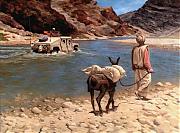... The security situation in Baghdad has been in free fall since the bombing of the Golden Mosque in Samarra on Feb. 22. In retrospect, that attack appears to be a turning point when the chief problem in Iraq went from being a Sunni-dominated insurgency to a civil war in which Shiite and Sunni militias are equally culpable. The result has been a horrifying surge in violence, with about 100 Iraqis dying every day, the bulk of them in Baghdad.
To restore order in the capital, I suggested adding at least 35,000 U.S. troops — in line with Lt. Gen. Ricardo Sanchez's comment in 2004 that he needed two divisions to control Baghdad. But that's not what Bush is sending. To bolster the 9,000 U.S. troops already in the capital, he is sending another brigade from northern Iraq, for a total of 13,000 U.S. troops, or less than one division. There will be an equal number of Iraqi troops — along with 35,000 Iraqi police officers, who are so sectarian and corrupt that they are more part of the problem than the solution.
If Bush thinks that a force this size can secure a city of more than 6 million people, he's not listening to the best professional military advice. An additional problem is that moving troops around Iraq, instead of sending extra units, may improve the situation in one spot but worsen the environment elsewhere. As a "senior American military official" in Iraq told McClatchy News Service, "You can't do clear-and-hold with the force structure we have."
If the present strategy doesn't work, what's the alternative? The most radical course would be a total U.S. withdrawal. The likely result would be an all-out civil war in which Iraqi casualties could easily soar to 1,000 a day and the price of oil could go above $100 a barrel. Proposals to carve up Iraq into three separate states — Sunni, Shiite and Kurd — would not ameliorate the violence because major cities such as Baghdad, Mosul and Kirkuk are full of different religious and ethnic groups that would fight for control...
But there's another course short of withdrawal: reducing U.S. forces from today's level of 130,000 to under 50,000 and changing their focus from conducting combat operations to assisting Iraqi forces. The money saved from downsizing the U.S. presence could be used to better train and equip more Iraqi units. A smaller U.S. commitment also would be more sustainable over the long term. This is the option favored within the U.S. Special Forces community, in which the dominant view is that most American soldiers in Iraq, with their scant knowledge of the local language and customs, are more of a hindrance than a help to the counterinsurgency effort.
Make no mistake: This is a high-risk strategy. The drawdown of U.S. troops could catalyze the Iraqis into getting their own house in order, or it could lead to a more rapid and violent disintegration of the rickety structure that now exists.
Which path should we take? My preference remains deploying more soldiers, not fewer. A couple of divisions in Baghdad, if skillfully led, might be able to replicate the success that Col. H.R. McMaster's 3rd Armored Cavalry Regiment had in pacifying the western city of Tall Afar, where the troops-to-civilians ratio was 10 times higher than in Baghdad today. But at this point, I am also open to a substantial reduction in troop numbers because the current strategy just isn't working...









Bookmarks